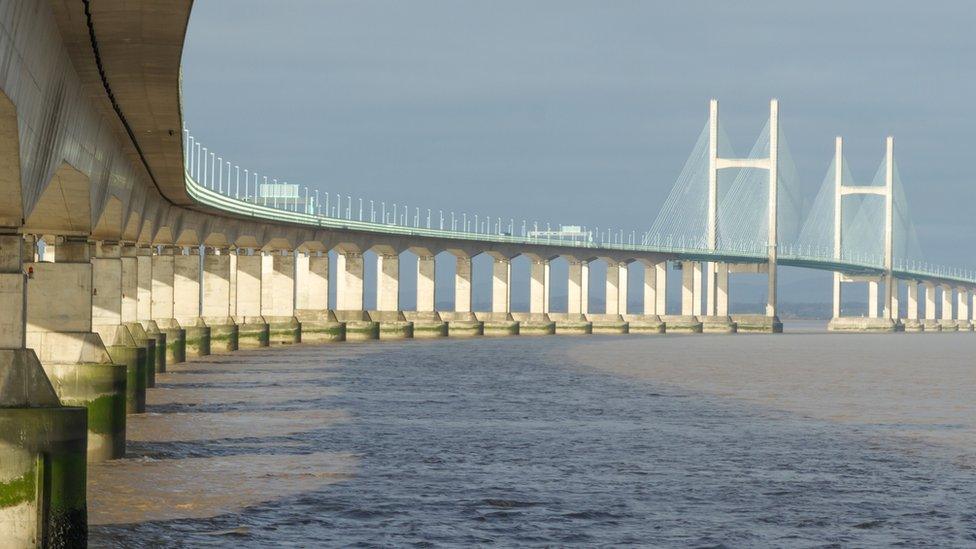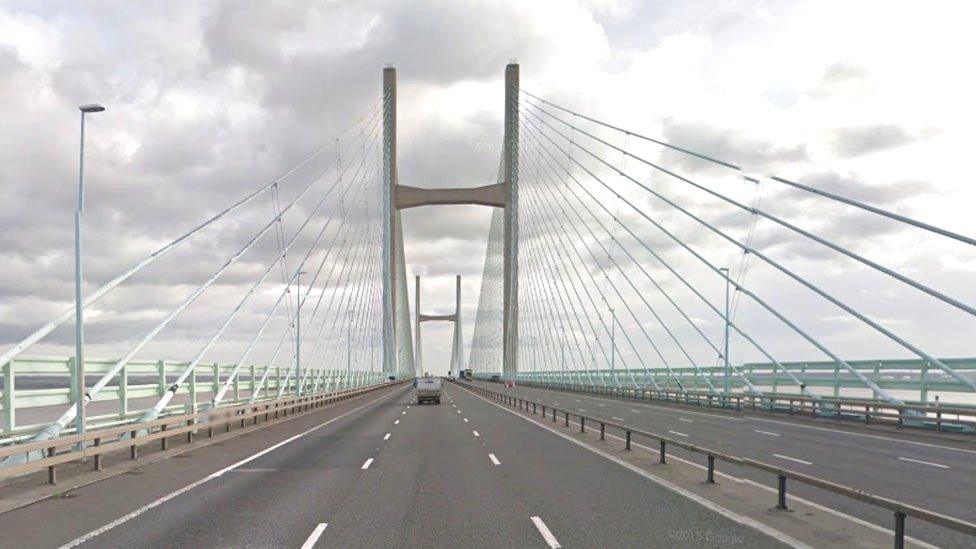Severn tolls: Charges could be levied both ways
- Published

Currently motorists are only charged to use the Severn Crossings when heading from England to Wales
Motorists could pay Severn tolls when heading either way between Wales and England if a new free-flowing tolling system is introduced, Welsh Secretary Alun Cairns has said.
The UK government is to consult on introducing a new system that would allow drivers to pay without stopping at a toll booth on the crossings.
Currently only westbound users pay.
One Labour MP called for jobs associated with any new tolling system to be kept locally.
Mr Cairns said the UK government was thinking of a toll of £1.80 to £1.90 each way for cars.
But he warned the technology could be "hugely expensive".
The original Severn Bridge, which opened in 1966, had two-way tolling until 1992, when one-way westbound-only tolls were introduced under the 1992 Severn Bridges Act, external as a measure to cut costs and congestion.
It is not clear when the consultation on tolls will begin, although the UK government has previously said this would be in the autumn.
Tolls for westbound car drivers are currently £6.60, although the government has committed to halve them in 2018 after the two Severn crossings move to public ownership.
'Hugely expensive'
Mr Cairns was speaking to business leaders at a breakfast event in Cardiff on Friday.
"We are also consulting on a free-flow toll system which would charge users both ways," he said, explaining the system would mean there would be no queues.
"We're thinking of about £1.80 or £1.90 each way for cars."
Mr Cairns said light vans would also cost the same price as cars.
The Dartford Crossing, over the River Thames on the eastern outskirts of London, uses a system based on automatic number plate recognition, allowing people to pay online, at retailers or by phone after or before they make the crossing.
The Welsh secretary said the UK government had been looking at how the system works on the Dartford Crossing, but warned that it was "hugely expensive to deliver and there's not much competition on the technology".



Readers gave the story a mixed reception on social media on Monday.
On Twitter, external Sarah Skilton called the story an "April fools joke".
Matt Smith wrote, external on Facebook that a DART charge system - like that on the Dartford Crossing - "would be brilliant for the Severn Bridge, and less than £2 each way isn't bad at all".
Jack Torrence argued that the toll charges needed to be reduced or scrapped altogether. "Surely it hinders the development of businesses in Wales," he said.
Meanwhile Jenni Moorhouse suggested the cost of the bridge toll was "not huge".
'Massive' congestion
Emma Watkins, director of business group CBI Wales, said free-flow tolling had to be part of an "overall package" of reducing the tolls and the perception of "Wales being open for business".
"Having queues at the tolls and queues at the Brynglas tunnels, as well as the cost of coming in, does not send a good message," she said.
But Ms Watkins added that the CBI was "aware there are very few suppliers of the system and there may be concerns about the cost of it".
"We know it has to be explored a bit further," she said.
Michael Gough, who runs a family haulage firm in Llandrindod Wells, Powys, feared that two-way tolls "could end up being a double tax on Wales if you weren't careful".
But he told BBC Radio Wales that technology to remove the toll booths would be "a great idea".
"The congestion at the tolls is massive," he told the Good Morning Wales programme.
"Quite often nowadays you get four or five mile queues coming back into Wales at a busy time of day."

Westbound-only tolls were introduced prior to the building of the Second Severn Crossing
Labour MP Jessica Morden, who represents Newport East, asked for more details on the timing of the consultation, which will also look at the future of the bridges once they return to public ownership.
"According to the last estimate, the bridges will return to public ownership as early as the end of 2017 - that doesn't leave much time for the government to sort this out," she said.
"I welcome the government looking at free-flow technology and lower tolls - although I would like them to reduce the cost even further."
Ms Morden also called for ministers to give assurances "that if we do go for free-flow then we keep the jobs associated with that locally for those who currently work for Severn River Crossings plc".
- Published16 March 2016

- Published4 July 2016
